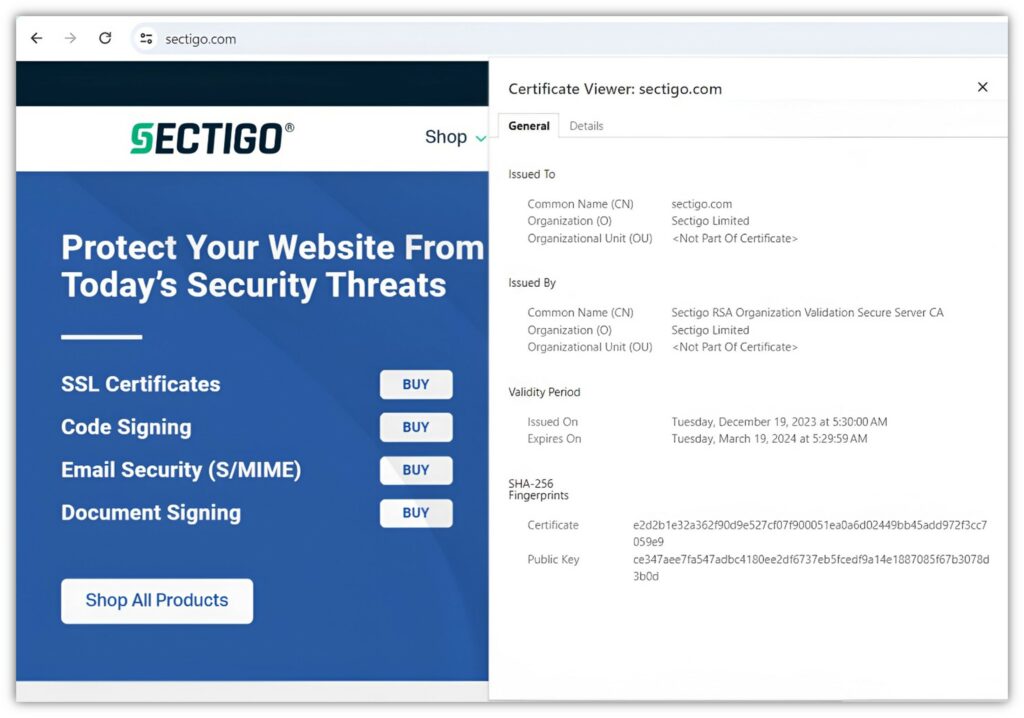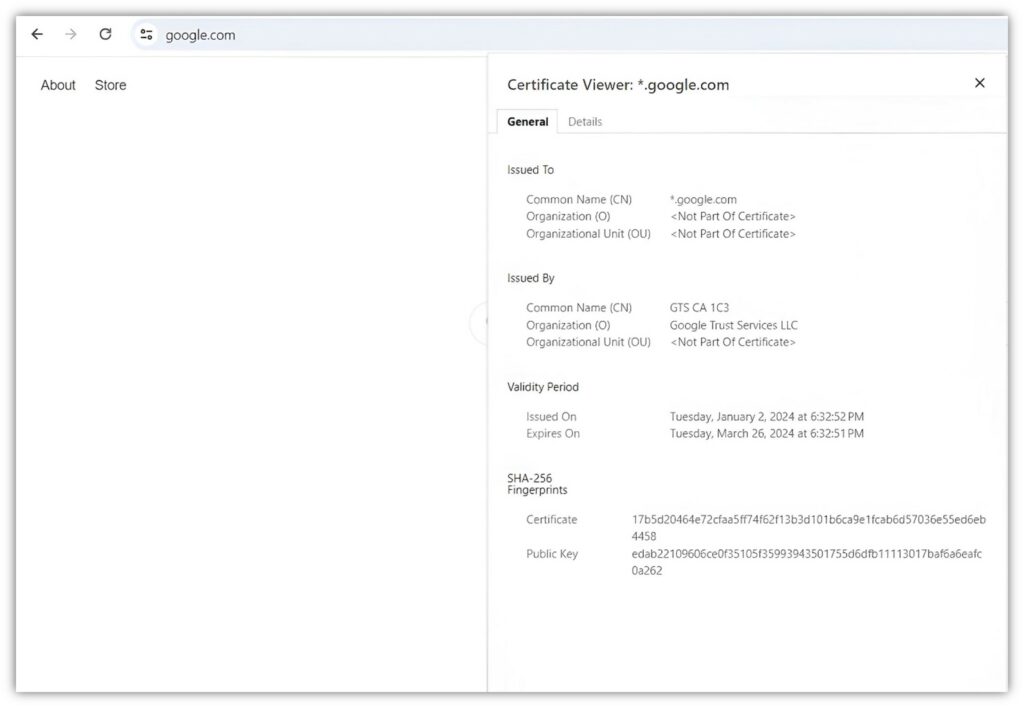Ensure you find the right SSL option for you by understanding wildcard SSL vs standard SSL…
In the world of SSL certificates, where there seems to be endless types, brands, validation levels, CAs and so on, it’s easy to feel lost or confused. But don’t worry, we got your back! We assume you’re here because you’re deciding between wildcard SSL vs standard SSL. These two SSL certificates help satisfy different needs. They both secure an HTTPS connection, but they don’t secure the same number of domains or type of domains. Here is what you need to know…
Wildcard SSL vs Standard SSL in a Nutshell
The quickest and to-the-point way of explaining standard SSL vs. wildcard SSL is:
- a standard (single domain) SSL certificate secures one domain name
- a wildcard SSL certificate secures your domain and an unlimited number of first-level subdomains
Keep on reading for a more in depth look at a standard ssl certificate vs wildcard ssl certificate…
What Is a Standard SSL Certificate?
Standard SSL is better known as a single domain SSL certificate that offers the lowest level of validation. This particular type of SSL certificate secures your domain name (i.e. www.whateveryourdomainnameis.com or whateveryourdomainnameis.com). The single domain SSL certificate ensures that when a user communicates with www.whateveryourdomainnameis.com, the information/data traveling from their browser (client) to the website (web server) does not get intercepted by a hacker.

In addition, you receive the following benefits from an SSL certificate:
- The coveted padlock icon in your URL
- Eliminates unwelcoming messages such as “not secure” next to your URL
- A small boost to your SEO
- The appearance of a safer, more trustworthy and professional brand/website
The wildcard SSL certificate provides all the same things and more…
PositiveSSL EV Certificates from $79.84/year!
Get the lowest prices on trusted SSL/TLS certificates from Sectigo brands.
Shop for Sectigo SSL CertificatesWhat Is a Wildcard SSL Certificate?
As mentioned above, a wildcard SSL certificate provides your users with a secure connection to your website as well as the other benefits of having an SSL certificate. What makes it different is that you can secure an unlimited number of subdomains with a wildcard SSL certificate. During the issuance process, all you have to do is put an asterisk, such as *.whateveryourdomainnameis.com, in the Fully Qualified Domain Name (FQDN) field to signify you want all of your subdomains secured in addition to your domain name.

This is what a subdomain looks like: subdomain.domainname.com. A subdomain basically acts as a mini website or subsection to your main website. Here are a few ways you can use a subdomain:
- A blog site or login page
- Sub-brand mini website, such as what Air Jordan is to Nike
- Product sections (maybe you want each product to have its own look and feel without feeling out of place)
- A media gallery or portfolio for photos or videos
Secure Unlimited Subdomains With One Wildcard SSL Certificate – Save 50%
Save 50% on Sectigo Wildcard SSL Certificates. Includes unlimited server licenses, reissuances, 256-bit encryption, and more.
Wildcard SSL vs. Standard SSL: A Quick Technical Overview
Now that we have a grasp of the basics, let’s take a few moments to quickly compare some of the similarities and differences between standard and wildcard SSL certificates:
| Feature | Standard SSL Certificates | Wildcard SSL Certificates |
| Encryption Strength | Offers 256-bit encryption strength. | Provides 256-bit encryption strength. |
| Coverage | A standard SSL certificate covers non-WWW and WWW versions of a single domain. | A wildcard SSL certificate covers non-WWW and WWW versions of a single domain and unlimited first-level subdomains. |
| Additional Coverage | Standard SSL certificates provide a basic level of authentication without thorough company evaluation. | A wildcard SSL certificate is ideal for securing a server and unlimited subdomains, suitable for SMEs, eCommerce websites, and large enterprises. |
| Who or What This Best Serves | Ideal for bloggers and small websites that don’t have subdomains to secure and don’t collect sensitive customer information. | Companies that need to secure multiple subdomains |
| Available Validation Level | A standard SSL certificate supports domain validation (DV). However, there are other single-domain SSL certificates that provide organization validation (OV), and extended validation (EV). | It supports DV and OV validation. |
| Warranty | A wildcard certificate warranty offers assurance to a brand in the event of an SSL certificate failure on the CA’s end. Warranties for standard SSL certificates range upwards of $500,000. | A wildcard certificate warranty protects a brand in the event that the SSL certificate the CA issued fails. Warranties for wildcard certificates range upwards of $1.5 million. |
| Encryption Protocols & Algorithms | It uses the SHA-2 algorithm, delivering up to 256-bit encryption and a 2048-bit RSA signature code. | It uses the SHA-2 algorithm, delivering up to 256-bit encryption and a 2048-bit RSA signature code. |
| Key Length | RSA 2048-bit and ECC 256-bit keys. | RSA 2048-bit and ECC 256-bit keys. |
| Cost | Standard SSL certificates have a lower cost (starting at approximately $8.78 per year). | Wildcard SSL certificates are relatively more expensive (starting at approximately $78.32 per year) due to the additional coverage of unlimited subdomains. |
A Closer Look at Wildcard SSL and Standard SSL Use Cases
Regular/Standard SSL Certificates
- Single Domain Websites: Regular SSL certificates are tailored to safeguard websites operating on a single domain. These certificates deploy robust encryption mechanisms, ensuring secure and confidential communication between users and the website.
- Blogs and Personal Websites: Individual bloggers and small websites with straightforward structures and no subdomains find regular SSL certificates to be an ideal fit. These certificates offer ample protection for their primary domain, fostering trust among visitors.
- Small Informational Websites: For small business websites that mainly provide information and have a basic online presence, a standard SSL certificate suffices for securing their domain. However, if they collect customer data, it’s prudent to upgrade to an organization validation (OV) SSL/TLS certificate as a minimum. This is because getting one requires a more rigorous validation process, which can further instill customer trust in your brand.
If you have subdomains to secure, then you’ll want to consider switching to a wildcard SSL/TLS certificate instead.
Wildcard SSL Certificates
- Multiple Subdomains: Wildcard SSL certificates cater to websites with multiple subdomains. Be it blog.example.com, shop.example.com, or mail.example.com, a wildcard certificate efficiently secures all subdomains under a single certificate. This helps to streamline your certificate management efforts and reduce certificate expiration-related risks.
- Content Management Systems (CMS): Websites built on CMS platforms often employ subdomains for distinct functionalities like blogs or members’ areas. Wildcard SSL certificates simplify security by providing comprehensive protection for all subdomains under one certificate, warranting a seamless and secure user experience.
- Large Enterprise Websites: Enterprises with extensive online infrastructure featuring numerous subdomains benefit from wildcard SSL certificates. Covering the main domain and all associated subdomains with a single certificate simplifies administration and reinforces security.
- eCommerce Sites with Subdomains: Wildcard SSL certificates prove invaluable for online stores that utilize many subdomains for various sections, such as product categories or regional sites. They extend robust security across all first-level subdomains without requiring multiple certificates.
- Web Hosting Companies: Web hosting providers offering wildcard SSL certificates enhance their service offerings. Customers can secure all hosted domains and subdomains with ease, strengthening security for their users and simplifying certificate management.
NOTE: For websites that collect sensitive personal data, you should use an organization validation (OV) certificate as a minimum. This validation requires your organization to undergo more stringent vetting before a publicly trusted CA will issue the certificate. This digital identity verification helps to provide greater peace of mind to customers because they’ll have greater confidence in your organization’s digital identity.
In summary, standard SSL/TLS certificates suit single-domain websites, while wildcard SSL certificates excel in securing websites with multiple subdomains on a single level. Evaluating a website’s structure and security requirements is vital in selecting the most appropriate SSL certificate for optimal protection.
Does Using a Wildcard SSL Certificate Have Any Drawbacks?
Are wildcard SSL certificates perfect? No. While wildcard SSL certificates offer numerous advantages, it’s essential to be aware of certain drawbacks when making your decision.
- Shared Private Key: The use of a shared private key among subdomains poses a risk. If compromised, all subdomains could be vulnerable to security breaches.
- No Extended Validation (EV) Option: By their very nature, wildcard certificates aren’t compatible with extended validation. This may be important for organizations requiring a higher level of validation and trust indicators.
- Single Point of Failure: A wildcard SSL certificate covers all subdomains on a single level via a single certificate, streamlining management. However, this centralization also means if the certificate’s private key is compromised, then any connections to the potentially unlimited subdomains it’s used to secure will be compromised. (This is why it’s imperative to securely store and manage all of your PKI private keys.)
- Certificate Installation Complexity: Managing certificates on multiple servers can be challenging, requiring careful handling of private keys and potential security risks during the installation process.
SectigoStore.com: A Trusted Source for Wildcard SSL Certificates: When purchasing your wildcard SSL certificate from SectigoStore.com, rest assured that you are choosing a reliable and reputable provider. SectigoStore.com is known for delivering top-notch security and unmatched customer support, ensuring your website’s protection.
Top-Tier Website Security Solutions: Sectigo Standard & Wildcard SSL Certificates
When comparing wildcard SSL vs standard SSL certificates, you’ll find that wildcard SSL certificates are priced slightly higher, starting at $78.32 per year. Now, compare this to standard SSL certificates, which start as low as $8.78 per year.
So, right from the jump (not including validation level or other considerations), you are looking at roughly a $70 difference. However, the investment pays off if you anticipate using multiple subdomains.
- Having multiple single domain SSL certificates can get confusing as you have to go through the issuance process every time you need a new cert and not to mention, they will have different expiration dates.
- With a wildcard SSL certificate, you can go through the entire SSL lifecycle for your domain and all of your subdomains in one swoop.
Streamline the process of managing multiple single domain SSL certificates with different expiration dates with a wildcard SSL certificate.
At SectigoStore.com, we offer both wildcard SSL certificate and standard SSL certificate options, providing top-tier security at affordable prices. Trust in our highly respected and longstanding CA to safeguard your online presence with SSL certificates that deliver peace of mind.
Choose SectigoStore.com for exceptional SSL solutions tailored to meet your website’s security demands.
SSL Certificate for Subdomain – How Do I Get One for My Website?
 (32 votes, average: 4.88 out of 5)
(32 votes, average: 4.88 out of 5)